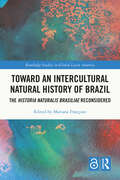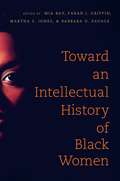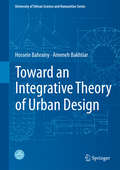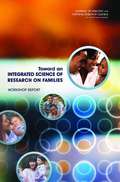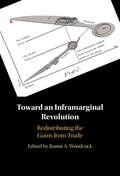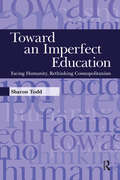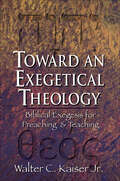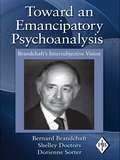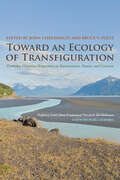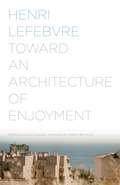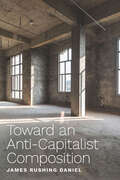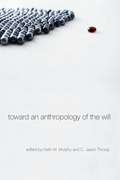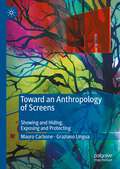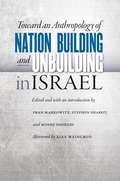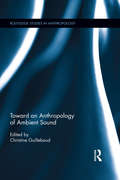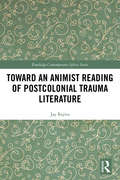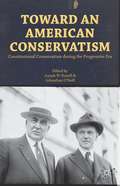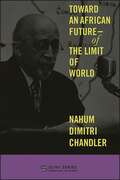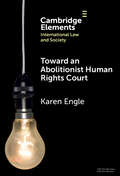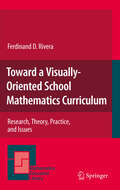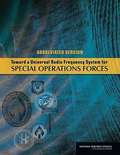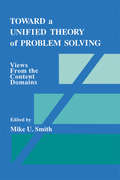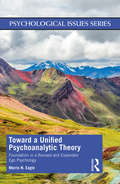- Table View
- List View
Toward an Intercultural Natural History of Brazil: The Historia Naturalis Brasiliae Reconsidered (Routledge Studies in Global Latin America)
by Mariana Françozo’This volume presents the first extensive census of the surviving copies of the treatise Historia Naturalis Brasiliae in libraries worldwide and examines it from a variety of interdisciplinary viewpoints. The chapters in this volume are written by scholars from different fields of knowledge, including anthropology, botany, linguistics, literature, book history, medieval and early modern history, and art history. The chapters contextualize the treatise vis-à-vis its predecessors and contemporaneous works of natural history and examine its botanical, zoological, and linguistic accuracy and usefulness in the present day. Put together, the seven chapters of this volume present a kaleidoscope of possibilities of how to re-interpret Piso and Marcgraf’s work within the dynamic context of knowledge-production about the ‘New’ Word in the early modern era, while also suggesting approaches to continue profiting from its subject matter in the present day. Toward an Intercultural Natural History of Brazil offers essential reading on the Historia Naturalis Brasiliae, natural history and Latin American history.
Toward an Intellectual History of Black Women
by Barbara Dianne Savage Martha S. Jones Mia Bay Farah J. GriffinDespite recent advances in the study of black thought, black women intellectuals remain often neglected. This collection of essays by fifteen scholars of history and literature establishes black women's places in intellectual history by engaging the work of writers, educators, activists, religious leaders, and social reformers in the United States, Africa, and the Caribbean. Dedicated to recovering the contributions of thinkers marginalized by both their race and their gender, these essays uncover the work of unconventional intellectuals, both formally educated and self-taught, and explore the broad community of ideas in which their work participated. The end result is a field-defining and innovative volume that addresses topics ranging from religion and slavery to the politicized and gendered reappraisal of the black female body in contemporary culture. Contributors are Mia E. Bay, Judith Byfield, Alexandra Cornelius, Thadious Davis, Corinne T. Field, Arlette Frund, Kaiama L. Glover, Farah J. Griffin, Martha S. Jones, Natasha Lightfoot, Sherie Randolph, Barbara D. Savage, Jon Sensbach, Maboula Soumahoro, and Cheryl Wall.
Toward an Integrative Theory of Urban Design
by Hossein Bahrainy Ameneh BakhtiarThis book takes a bold epistemological approach to address the fundamental questions that urban design has faced since its inception - questions concerning its legitimacy, definition, nature, content, purpose, theory, methods, jurisdiction and above all its knowledge base. The appropriate level of urban design - global or local - is another critical and emerging question discussed. At the end, an integrative theory of urban design is introduced, on the basis of which a set of principles is developed for application by practicing urban designers. These principles are presented at three essential levels: general, global and local-Iranian. Toward an Integrative Theory of Urban Design is intended to dispel many of the ambiguities still troubling urban design as a discipline and profession.
Toward an Integrated Science of Research on Families: Workshop Report
by Institute of Medicine National Research Council of the National AcademiesDemographic changes, immigration, economic upheavals, and changing societal mores are creating new and altered structures, processes, and relationships in American families today. As families undergo rapid change, family science is at the brink of a new and exciting integration across methods, disciplines, and epistemological perspectives. The purpose of The Science of Research on Families: A Workshop, held in Washington, DC, on July 13-14, 2010, was to examine the broad array of methodologies used to understand the impact of families on children's health and development. It sought to explore individual disciplinary contributions and the ways in which different methodologies and disciplinary perspectives could be combined in the study of families. Toward an Integrated Science of Research on Families documents the information presented in the workshop presentations and discussions. The report explores the idea of family research as being both basic and applied, offering opportunities for learning as well as intervention. It discusses research as being most useful when organized around particular problems, such as obesity or injury prevention. Toward an Integrated Science of Research on Families offers a problem-oriented approach that can guide a broad-based research program that extends across funders, institutions, and scientific disciplines.
Toward an Inframarginal Revolution: Redistributing the Gains from Trade
by Ramsi A. WoodcockOver the past fifteen years, there has been a growing interest in altering legal rules to redistribute wealth, with many scholars believing that neoclassical economic theory is biased against redistribution. Yet a growing number of progressive scholars are pushing back against this view. Toward an Inframarginal Revolution offers a fresh perspective on the redistribution of wealth by legal scholars who argue that the neoclassical concept of the gains from trade provides broad latitude for redistribution that will not harm efficiency. They show how policymakers can redistribute wealth via taxation, price regulation, antitrust, consumer law, and contract law by focusing on the prices at which inframarginal units of production change hands. Progressive and eye-opening, this volume uses conservative economic concepts to make a compelling case for radically redistributing wealth. This title is part of the Flip it Open Programme and may also be available open access. Check our website Cambridge Core for details.
Toward an Informal Account of Legal Interpretation
by Allan C. HutchinsonToward an Informal Account of Legal Interpretation offers a viable account of law, judicial decision-making, and legal interpretation that is as fresh as it is familiar. The author expertly challenges the dominant mode of formalist theorizing and proposes an explanatory account of legal interpretation that can profitably be understood as an 'informal' intervention. Such an informal approach has no truck with either the claims of the formalists (i. e. , that law is something separate from ideology) or those of the anti-formalists (i. e. , that law is nothing other than ideological posturing). Hutchinson insists that, when understood properly, legal interpretation is an applied exercise in law-and-ideology; it is both constrained and unconstrained in equal measure. In developing this informalist account through a sustained application of the 'no vehicles in the park' rule, this book is wide-ranging in theoretical scope and substance, but also accessible and practical in style.
Toward an Imperfect Education: Facing Humanity, Rethinking Cosmopolitanism (Interventions: Education, Philosophy, And Culture Ser.)
by Sharon ToddThe theory of cosmopolitanism is built on a paradoxical commitment to a universal idea of humanity and to a respect for human pluralism. Toward an Imperfect Education critiques the assumed "goodness" of humans that underwrites the idea of humanity and explores how antagonistic human interactions such as conflict, violence, and suffering are a fundamental aspect of life in a pluralistic world. This book proposes that the inescapable difference between humans compels our ethical and political observations in education. Todd persuasively argues that facing humanity in all its complexity and imperfection ought to be a central element of the cosmopolitan project to create a more just and humane education. Informed primarily by poststructural philosophy and feminist theory, she focuses on how sexual, cultural, and religious difference intersect with universal claims made in the name of humanity. Individual chapters develop a novel framework for dealing with antagonism in relation to human rights, democracy, citizenship, and cross-cultural understanding.
Toward an Exegetical Theology
by Walter C. Kaiser Jr.Proposes a method of biblical interpretation consisting of the following steps: contextual analysis, syntactical analysis, verbal analysis, theological analysis, and homiletical analysis.
Toward an Emancipatory Psychoanalysis: Brandchaft's Intersubjective Vision (Psychoanalytic Inquiry Book Series)
by Bernard Brandchaft Shelley Doctors Dorienne SorterBest known for his contributions to the development of contemporary intersubjectivity theory, Bernard Brandchaft has dedicated a career to the advancement of psychoanalytic theory and practice. Continually searching for a theoretical viewpoint that would satisfactorily explain the clinical phenomena he was encountering, his curiosity eventually led him to the work of Heinz Kohut and the then-emerging school of self psychology. However, seemingly always one step ahead of the crowd, Brandchaft constantly reformulated his ideas about and investigations into the intersubjective nature of human experiences. Many of the chapters in this volume have never before been published. Together, they articulate the evolution of Brandchaft's thinking along the road toward an emancipatory psychoanalysis. Moreover, commentary from Shelley Doctors and Dorienne Sorter – in addition to Bernard Brandchaft himself – examines the clinical implications of the theoretical shifts that he advocated and provides a contemporary context for the case material and conclusions each paper presents. These theoretical shifts, both clear and subtle, are thereby elucidated to form the grand narrative of a truly visionary psychoanalytic thinker.
Toward an Effective Supervision of Partially Dollarized Banking Systems
by Eva Gutierrez Antonio Garcia Pascual Jorge Cayazzo Soccorro HeysenA report from the International Monetary Fund.
Toward an Ecology of Transfiguration: Orthodox Christian Perspectives on Environment, Nature, and Creation (Orthodox Christianity and Contemporary Thought)
by John Chryssavgis and Bruce V. FoltzCan Orthodox Christianity offer spiritual resources uniquely suited to the environmental concerns of today? This book makes the case emphatically that it can indeed. In addition to being the first substantial and comprehensive collection of essays, in any language, to address environmental issues from the Orthodox point of view, this volume (with contributions from many of the most influential theologians and philosophers in contemporary world Orthodoxy) will engage a wide audience, in academic as well as popular circles—resonating not only with Orthodox audiences but with all those in search of a fresh approach to environmental theory and ethics that can bring to bear the resources of ancient spirituality, often virtually unknown in the West, on modern challenges and dilemmas.
Toward an Architecture of Enjoyment
by Henri LefebvreToward an Architecture of Enjoyment is the first publication in any language of the only book devoted to architecture by Henri Lefebvre. Written in 1973 but only recently discovered in a private archive, this work extends Lefebvre&’s influential theory of urban space to the question of architecture. Taking the practices and perspective of habitation as his starting place, Lefebvre redefines architecture as a mode of imagination rather than a specialized process or a collection of monuments. He calls for an architecture of jouissance—of pleasure or enjoyment—centered on the body and its rhythms and based on the possibilities of the senses.Examining architectural examples from the Renaissance to the postwar period, Lefebvre investigates the bodily pleasures of moving in and around buildings and monuments, urban spaces, and gardens and landscapes. He argues that areas dedicated to enjoyment, sensuality, and desire are important sites for a society passing beyond industrial modernization. Lefebvre&’s theories on space and urbanization fundamentally reshaped the way we understand cities. Toward an Architecture of Enjoyment promises a similar impact on how we think about, and live within, architecture.
Toward an Anti-Capitalist Composition
by James Rushing DanielIn Toward an Anti-Capitalist Composition, James Rushing Daniel argues that capitalism is eminently responsible for the entangled catastrophes of the twenty-first century—precarity, economic and racial inequality, the decline of democratic culture, and climate change—and that it must accordingly become a central focus in the teaching of writing. Delving into pedagogy, research, and institutional work, he calls for an ambitious reimagining of composition as a discipline opposed to capitalism’s excesses. Drawing on an array of philosophers, political theorists, and activists, Daniel outlines an anti-capitalist approach informed by the common, a concept theorized by Pierre Dardot and Christian Laval as a solidaristic response to capitalism rooted in inventive political action. Rather than relying upon claims of membership or ownership, the common supports radical, collective acts of remaking that comprehensively reject capitalist logics. Applying this approach to collaborative writing, student debt, working culture, and digital writing, Daniel demonstrates how the writing classroom may be oriented toward capitalist harms and prepare students to critique and resist them. He likewise employs the common to theorize how anti-capitalist interventions beyond the classroom could challenge institutional privatization and oppose the adjunctification of the professoriate. Arguing that composition scholars have long neglected marketization and corporate power, Toward an Anti-Capitalist Composition extends a case for adopting a resolute anti-capitalist stance in the field and for remaking the university as a site of common work.
Toward an Anthropology of the Will
by Keith Murphy C. ThroopToward an Anthropology of the Will is the first book that systematically explores volition from an ethnographically informed anthropological point of view. While philosophers have for centuries puzzled over the degree to which individuals are "free" to choose how to act in the world, anthropologists have either assumed that the will is a stable, constant fact of the human condition or simply ignored it. Although they are usually quite comfortable discussing the relationship between culture and cognition or culture and emotion, anthropologists have not yet focused on how culture and volition are interconnected. The contributors to this book draw upon their unique insights and research experience to address fundamental questions, including: What forms does the will take in culture? How is willing experienced? How does it relate to emotion and cognition? What does imagination have to do with willing? What is the connection between morality, virtue, and willing? Exploring such questions, the book moves beyond old debates about "freedom" and "determinacy" to demonstrate how a richly nuanced anthropological approach to the cultural experience of willing can help shape theories of social action in the human sciences.
Toward an Anthropology of Screens: Showing and Hiding, Exposing and Protecting
by Mauro Carbone Graziano LinguaThis book shows that screens don’t just distribute the visible and the invisible, but have always mediated our body's relationships with the physical and anthropological-cultural environment. By combining a series of historical-genealogical reconstructions going back to prehistoric times with the analysis of present and near-future technologies, the authors show that screens have always incorporated not only the hiding/showing functions but also the protecting/exposing ones, as the Covid-19 pandemic retaught us. The intertwining of these functions allows the authors to criticize the mainstream ideas of images as inseparable from screens, of words as opposed to images, and of what they call “Transparency 2.0” ideology, which currently dominates our socio-political life. Moreover, they show how wearable technologies don’t approximate us to a presumed disappearance of screens but seem to draw a circular pathway back to using our bodies as screens. This raises new relational, ethical, and political questions, which this book helps to illuminate.
Toward an Anthropology of Nation Building and Unbuilding in Israel (Studies of Jews in Society)
by Fran Markowitz Moshe Shokeid Stephen Sharot Alex WeingrodToward an Anthropology of Nation Building and Unbuilding in Israel presents twenty-two original essays offering a critical survey of the anthropology of Israel inspired by Alex Weingrod, emeritus professor and pioneering scholar of Israeli anthropology. In the late 1950s Weingrod’s groundbreaking ethnographic research of Israel’s underpopulated south complicated the dominant social science discourse and government policy of the day by focusing on the ironies inherent in the project of Israeli nation building and on the process of migration prompted by social change. Drawing from Weingrod’s perspective, this collection considers the gaps, ruptures, and juxtapositions in Israeli society and the cultural categories undergirding and subverting these divisions. Organized into four parts, the volume examines our understanding of Israel as a place of difference, the disruptions and integrations of diaspora, the various permutations of Judaism, and the role of symbol in the national landscape and in Middle Eastern studies considered from a comparative perspective. These essays illuminate the key issues pervading, motivating, and frustrating Israel’s complex ethnoscape.
Toward an Anthropology of Ambient Sound (Routledge Studies in Anthropology)
by Christine GuillebaudThis volume approaches the issue of ambient sound through the ethnographic exploration of different cultural contexts including Italy, India, Egypt, France, Ethiopia, Scotland, Spain, Portugal, and Japan. It examines social, religious, and aesthetic conceptions of sound environments, what types of action or agency are attributed to them, and what bodies of knowledge exist concerning them. Contributors shed new light on these sensory environments by focusing not only on their form and internal dynamics, but also on their wider social and cultural environment. The multimedia documents of this volume may be consulted at the address: milson.fr/routledge_media.
Toward an Animist Reading of Postcolonial Trauma Literature: Reading Beyond the Single Subject (Routledge Contemporary Africa)
by Jay RajivaThis book uses the conceptual framework of animism, the belief in the spiritual qualities of nonhuman matter, to analyze representations of trauma in postcolonial fiction from Nigeria and India. Toward an Animist Reading of Postcolonial Trauma Literature initiates a conversation between contemporary trauma literatures of Nigeria and India on animism. As postcolonial nations move farther away from the event of decolonization in real time, the experience of trauma take place within and is generated by an increasingly precarious environment of resource scarcity, over-accelerated industrialization, and ecological crisis. These factors combine to create mixed environments marked by constantly changing interactions between human and nonhuman matter. Examining novels by authors such as Chinua Achebe, Jhumpa Lahiri, Nnedi Okorafor, and Arundhati Roy, the book considers how animist beliefs shape the aesthetic representation of trauma in postcolonial literature, paying special attention to complex metaphor and narrative structure. These literary texts challenge the conventional wisdom that working through trauma involves achieving physical and psychic integrity in a stable environment. Instead, a type of provisional but substantive healing emerges in an animist relationship between human trauma victims and nonhuman matter. In this context, animism becomes a pivotal way to reframe the process of working through trauma. Offering a rich framework for analyzing trauma in postcolonial literature, this book will be of interest to scholars of postcolonial literature, Nigerian literature and South Asian literature.
Toward an American Conservatism: Constitutional Conservatism during the Progressive Era
by Joseph Postell Johnathan O’neilDuring the Progressive Era (1880-1920), leading thinkers and politicians transformed American politics. Historians and political scientists have given a great deal of attention to the progressives who effected this transformation. Yet relatively little is known about the conservatives who opposed these progressive innovations, despite the fact that they played a major role in the debates and outcomes of this period of American history. These early conservatives represent a now-forgotten source of inspiration for modern American conservatism. This volume gives these constitutional conservatives their first full explanation and demonstrates their ongoing relevance to contemporary American conservatism.
Toward an African Future—Of the Limit of World (SUNY series, Literature... in Theory)
by Nahum Dimitri ChandlerExamines the thought of W. E. B. Du Bois, with attention to its potential for reorienting present-day critical theory and political philosophy.Widely known for his probing analysis of W. E. B. Du Bois's early work, in this book Nahum Dimitri Chandler references writing from across the whole of Du Bois's long career, while bringing sharp focus on two later texts issued in the immediate aftermath of World War II-Color and Democracy: Colonies and Peace and The World and Africa: An Inquiry into the Part which Africa Has Played in World History. In these texts, "the problem of the color line," which Du Bois had already characterized as the problem not only of the twentieth century, but of the modern epoch as a whole, is further figured as a global problem, as a horizon linking the contemporary conjuncture of the history of modern systems of enslavement with the ongoing impact of modern colonialism and imperialism on the world's possible futures. On this line of thought, Chandler proposes that the name of "Africa" is a theoretical metaphor that enables a hyperbolic re-narrativization of modern historicity. Du Bois thus emerges as an exemplary thinker of history and hope for the world beyond the limit of the present.
Toward an Abolitionist Human Rights Court: Rethinking Responses to Gendered and Racialized Violence (Elements in International Law and Society)
by Karen EngleContemporary international human rights law increasingly obligates states to heighten their criminalization of certain human rights violations, including gendered, racialized, and homophobic violence. This Element uses prison and police abolitionist thought to challenge this trend. It focuses on the European Court of Human Rights (ECtHR), arguing that the Court's reliance on punishment and policing threatens to undo earlier European approaches to criminal law and human rights that resonate with abolitionist thought. It also contends that the criminalization approach provides the Court with an alibi for not recognizing or attending to the deeply structural racialized, colonial, sexual, gendered, and homophobic violence in Europe, particularly but not only against Roma communities and Black and Muslim migrants. Encouraging human rights advocates and judges to take seriously prison and police abolition in Europe and elsewhere, the Element calls for the ECtHR to pave the way for an abolitionist-oriented turn among human rights courts.
Toward a Visually-Oriented School Mathematics Curriculum
by Ferdinand RiveraWhat does it mean to have a visual representation of a mathematical object, concept, or process? What visualization strategies support growth in mathematical thinking, reasoning, generalization, and knowledge? Is mathematical seeing culture-free? How can information drawn from studies in blind subjects help us understand the significance of a multimodal approach to learning mathematics? Toward a Visually-Oriented School Mathematics Curriculum explores a unified theory of visualization in school mathematical learning via the notion of progressive modeling. Based on the author's longitudinal research investigations in elementary and middle school classrooms, the book provides a compelling empirical account of ways in which instruction can effectively orchestrate the transition from personally-constructed visuals, both externally-drawn and internally-derived, into more structured visual representations within the context of a socioculturally grounded mathematical activity. Both for teachers and researchers, a discussion of this topic is relevant in the history of the present. The ubiquity of technological tools and virtual spaces for learning and doing mathematics has aroused interest among concerned stakeholders about the role of mathematics in these contexts. The book begins with a prolegomenon on the author's reflections on past and present visual studies in mathematics education. In the remaining seven chapters, visualization is pursued in terms of its role in bringing about progressions in mathematical symbolization, abduction, pattern generalization, and diagrammatization. Toward a Visually-Oriented School Mathematics Curriculum views issues surrounding visualization through the eyes of a classroom teacher-researcher; it draws on findings within and outside of mathematics education that help practitioners and scholars gain a better understanding of what it means to pleasurably experience the symmetric visual/symbolic reversal phenomenon - that is, seeing the visual in the symbolic and the symbolic in the visual."
Toward a Universal Radio Frequency System for Special Operations Forces
by National Research Council of the National AcademiesThe U.S. Special Operations Command (SOCOM) was formed in response to the failed rescue attempt in 1980 of American hostages held by Iran. Among its key responsibilities, SOCOM plans and synchronizes operations against terrorist networks. Special operations forces (SOF) often operate alone in austere environments with only the items they can carry, which makes equipment size, weight, and power needs especially important. Specialized radios and supporting equipment must be carried by the teams for their radio-frequency (RF) operations. As warfighting demands on SOCOM have intensified, SOCOM's needs for significantly improved radio-frequency (RF) systems have increased. Toward a Universal Radio Frequency System for Special Operations Forces examines the current state of the art for both handheld and manpackable platform-mounted RF systems, and determines which frequencies could be provided by handheld systems. The book also explores whether or not a system that fulfills SOF's unique requirements could be deployed in a reasonable time period. Several recommendations are included to address these and other issues.
Toward a Unified Theory of Problem Solving: Views From the Content Domains
by Mike U. SmithOne of the most active fields of educational research in recent years has been the investigation of problem-solving performance. Two opposing views of current research -- one suggesting that there are more differences than similarities within different domains, and the other stating that there is great similarity -- lead to a variety of questions: * Is problem solving a single construct? * Are there aspects of problem-solving performance that are similar across a variety of content domains? * What problem-solving skills learned within one context can be expected to transfer to other domains? The purpose of this book is to serve as the basis for the productive exchange of information that will help to answer these questions -- by drawing together preliminary theoretical understandings, sparking debate and disagreement, raising new questions and directions, and perhaps developing new world views.
Toward a Unified Psychoanalytic Theory: Foundation in a Revised and Expanded Ego Psychology (Psychological Issues)
by Morris N EagleThis book aims to integrate different psychoanalytic schools and relevant research findings into an integrated psychoanalytic theory of the mind. A main claim explored here, is that a revised and expanded ego psychology constitutes the strongest foundation not only for a unified psychoanalytic theory, but also for the integration of relevant research findings from other disciplines. Sophisticated yet accessible, the book includes a description of the basic tenets of ego psychology and necessary correctives and revisions. It also discusses research and theory on interpersonal understanding, capacity for inhibition, defense, delay of gratification, autonomous ego aims and motives, affect regulation, the nature of psychopathology; and the implications of a revised and expanded ego psychology for approaches to treatment. The book will appeal to readers who are interested in psychoanalysis, the nature of the mind, the nature of psychopathology, and the implications of theoretical formulations and research findings for approaches to treatment. As such, it will also be of great value on graduate and training courses for psychoanalysis.
